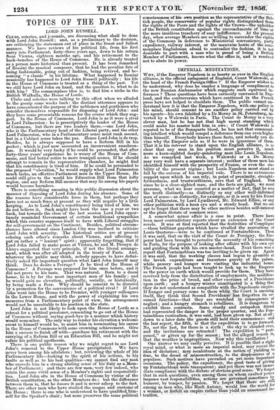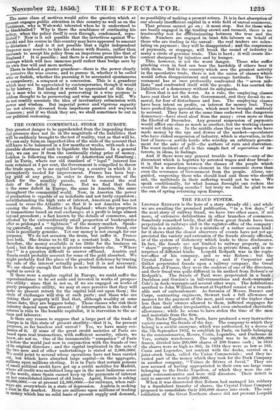IMPERIAL MEDITATIONS.
WHY, if the Emperor Napoleon is as hearty as ever in the English alliance, is the official antagonist of England, Count Walewski, at the head of the French Foreign Office ? if the Emperor wishes to be understood, why does he employ a language of compliment to the new Russian Ambassador which suggests such equivocal in- ferences ? These questions have been earnestly canvassed in Eng- land, and the controversies which have continued in the French press have not helped to elucidate them. The public cannot un- d.erstand how it is that the Emperor Napoleon, with one policy in his mind, should consent to see another policy carried out by his agents—his own falsified by a De Money in St. Petersburg, in vetted by a Walewski in Paris. The Count de Morey is a very clever man, but he has not that high moral standing which could make his master hold him in awe ; if Count Walewski is reputed to be of the Bonaparte blood, he has not that command- ing intellect which would compel a deference from one even higher than himself. Everybody knows these facts, and nobody can di- vine why the Emperor acts as if he were in ignorance of them. That it is his interest to stand upon the English affiance, is se clear that any man in his position must perceive it, inneh more a keen-sighted deeply-pondering man like Louis Napoleon. As we remarked last week, a Walewski or a be Moray may very well have a separate interest ; neither of those men has identified himself with the prosperity of France, or even the sta- bility of the present regime ; but Louis Napoleon must stand or fall by the success of his imperial rule. There is no extraneous support upon which he can rely, in point of proximity, straight- forwardness, and trustworthiness, save that of England. But since he is a clear-sighted man, and the facts are plain, we must presume, what we hear asserted as a matter of fact, that he sees the truth distinctly—as distinctly as any other well-informed man of sense—as distinctly, for example, as it is seen by his friend Lord Palmerston, by Lord Lyndhurst, Mr. Edward Ellice, or any other-politician with a keen eye and a steady head. But we are apt to forget that there may be other motives besides self-interest or the plain dictate of common sense.
A somewhat minor affair is a case in point. There have
been most contradictory reports about an extension of the Court reveli. It was at first reported that the festivities of CoMpiegne —those brilliant gayeties which have rivalled the recreations of Louis Quatorze—were to be continued at Fontainebleau. Then it was said, that on the visit of the Count de Persigny, the Em- peror had been brought to perceive the necessity of his remaining in Paris, for the purpose of looking after affairs with his own eye and guiding them with his own master-hand. Next there was a report that Fontainebleau was too inviting to be given up. Again it was said, that the working classes had begun to grumble at the lavish expenditure and luxurious gayety. of the palace, while penury and hunger were visiting the industrial home. The French people had been taught to look up to the Emperor as the power on earth which would provide for them. They have received help from the distribution of employments, the modifica- tion in the price of bread, and other exercises of a Providence upon earth ; and a hungry winter unmitigated is a thing that they do not understand as compatible with the Napoleonic empire. If hunger and penury come to them while the Court is amusing itself, they think that Second Providence has forgotten its as- sumed functions—that they are wretched in consequence of neglect; and a hungry stomach is rebellious. It is dangerous to exhibit these contrasts. Some sturdy and outspoken friend had represented the danger in the proper quarter, and the Fon- tainebleau rustication, it was said, had been given up. Not at all: down to a later date the guests still held their summonses ; and the last report, the fifth, is that the expedition is to go forward. No, not the last, for there is a sixth : the sky is clouded over, and the invitations are retracted ! The expedition is " post- poned," or given up for• the season ; but the alleged reason is, that the weather is unpropitious. Now why this vacillation ? One answer we may easily perceive. It is possible that a right royal mind, or what is more an imperial mind, may resent the idea of dictation-; may recaleitrate at the notion of yielding to fear, to the dread of misconstruction, to the displeasures of populace. Such motives have prevailed on yet more important occasions. The policy, the expediency, the good taste of giving tip Fontainebleau were transparent ; and yet there was not imme- diate compliance with the dictate of obvious good sense. We forget
that in such questions, even among those on whom exalted power imposes vast responsibilities, actions are governed sometimes by humour, by temper, by passion. We forget that there are still among us men who, like Mark Antony, would lose the world. for a woman, or forfeit an empire rather than yield an announeed tentron.
The same class of motives would solve the question which at present engages public attention in this country as well as on the Continent, why is Walewaki tolerated when he is understood to be blackballed? Why is there the semblance of continuing his pokey, when the policy itself is seen through, condemned, repu- diated ? Now is it not possible that the invectives against Wa- iewski and his course in this country may have appeared to amount to dictation ? And is it not possible that a right independent Emperor may resolve to take his chance with Russia, rather than suceumb to accept his policy from an imperious press like that of England ? It is possible ; and there is a certain grandeur in the courage which will face immense peril rather than budge save by its own free will and mere motion. There is indeed a greater grandeur—there is the power clearly to perceive the wise course, and to pursue it, whether it be called wise or foolish, whether the pursuing it be accounted spontaneous or compulsory, a conquest or a concession. This is a grandeur which may not be appreciated by contemporaries, though it would be by history. But indeed it would be appreciated at this day ; for a man who is strong and persevering in a wise purpose is seldom thought to be persevering and wise against his will. We do not readily associate the idea of involuntary submission with power and wisdom. But imperial power and vigorous sagacity are not always divorced from impetuous passion and wayward humours ; and if we think they are, we shall sometimes be out in our political reckoning.



























 Previous page
Previous page